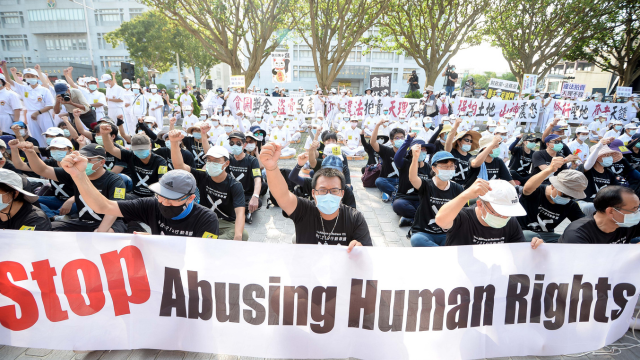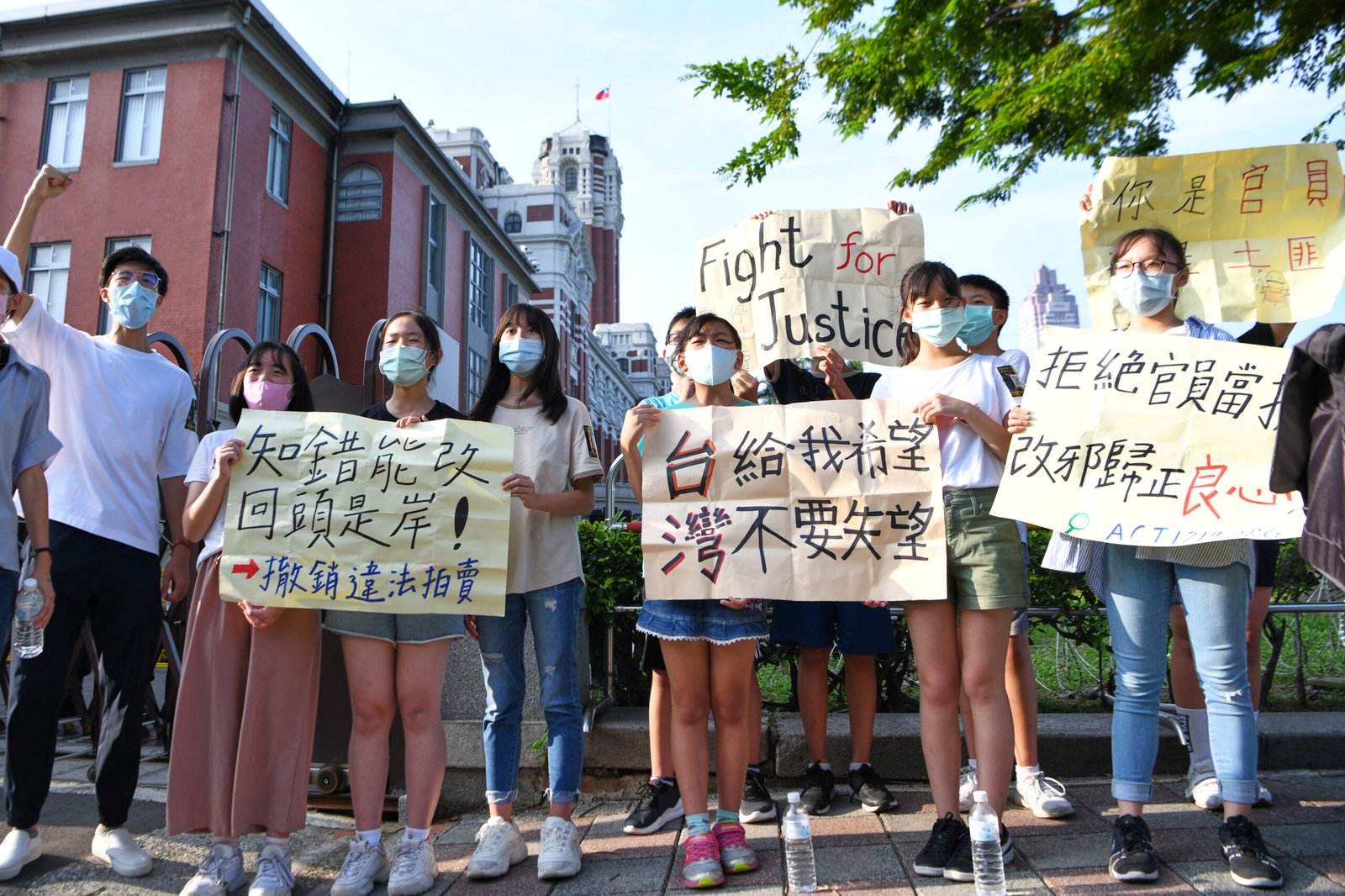The enforcement of tax bills consistently intrudes on citizens’ lives and unduly restricts fundamental human rights.
by Bitter Winter
Article 3 of 5. Read article 1 and article 2.

Taiwan’s enforcement practices violate Article 11, which guarantees everyone’s right to an adequate standard of living.
I. It is mentioned in Notes 98 of the Common Core Document of the Fourth National Report on the ICCPR and ICESCR (2025) that the Housing Act, Taxpayer Rights Protection Act, Income Tax Act, Land Tax Act, House Tax Act, etc., serve as evidence that relevant laws and regulations have been established in the country to protect everyone’s right to an adequate standard of living for themselves and their family members, as well as citizens’ housing rights. However, according to Notes 207 and 208 on the implementation of the ICESCR regarding the waiver of lease for the disadvantaged, and Notes 220 to 221 on the protection of rights to adequate housing, despite the regulations listed in the report, the country has entirely failed to review the system or evaluate the various agencies and the conduct of civil servants for any violations or restrictions on people’s fundamental human rights.
According to Article 25 of the Universal Declaration of Human Rights, the Preamble and Article 11 of the ICESCR, people have the right to an adequate standard of living for themselves and their families, including food, clothing, housing, medical care, and essential social services. The state is responsible for promoting universal respect for and observance of human rights and freedoms. However, considering the current situation in Taiwan regarding tax enforcement, there are widespread and severe human rights violations, such as excessive compulsory enforcement and the seizure of assets of excessive value. Some officials have even publicly stated in the media that payment notices will be sent to those owing fees, and if payment is not made within the deadline, salary or savings deductions will start; if the obligor lacks sufficient funds to pay the arrears, the branch office will conduct visits to the obligor’s residence; and if the total arrears exceed NT$5,000, the obligor’s car or other property may be seized and auctioned to recover the debt. Therefore, if the overdue tax reaches NT$5,000, the obligor’s car or other property could be seized (see the news report: “I Dare Not to Do It Again! Drunk Driver Owing NTD$120,000 Fine, Tax Authorities Seizing House with an Iron Fist, Taxpayer Paying Off in Five Days”; and “National Highway Tolls owed! House of Miaoli’s ‘Toll Evasion Champion’ Foreclosed”).
A house valued at over NT$2 million was sealed because of NT$120,000 in unpaid taxes. This violates the principle of proportionality, and the government is evidently breaching its duties as outlined in Article 11 of the ICESCR.
- Situation of Taiwan’s tax enforcement practice
1. Excessive compulsory enforcement
The number of tax and fee arrears pending compulsory enforcement by Taiwan’s Administrative Enforcement Agency has risen annually. In 2021, there were 14.04 million mandatory new enforcement cases across various branches of the Agency. That number was 13.38 million in 2022, 14.04 million in 2023, and 13.54 million in 2024. From January to July 2025, the number of cases reached 8.79 million. Given Taiwan’s population of 23 million, this means roughly one compulsory enforcement case per 1.6 people, with about 1.25 million administrative enforcement cases monthly. Consequently, it is estimated that the enforcement rate for 2025 will surpass 70% of Taiwan’s population, which is highly abnormal and unreasonable. This indicates that the Ministry of Justice has failed to properly review and improve laws and administrative measures that violate the Two Covenants, as noted in Note 9 of Article 2 of the Third National Report on the ICCPR. Instead, it allowed its subordinate Administrative Enforcement Agency to carry out excessive enforcement, leading to widespread and serious violations of people’s livelihoods, housing, and property rights.

2. Auction processes do not comply with the principle of proportionality
Although Taiwan’s Administrative Execution Act, Compulsory Enforcement Act (Article 50), and Article 15 of the Taxpayer Rights Protection Act state that the enforcement of tax cases should not exceed what is necessary to achieve the intended purpose, and that the least infringing method should be used, with provisions emphasizing the principle of proportionality and the spirit of avoiding excessive attachments, there are many cases where auction processes do not follow the principle of proportionality and violate human rights. There are also instances where individuals’ property rights and even housing rights are violated due to excessive attachments.
Specific example:
– Keelung resident Chen Ching-hsu had accumulated NT$18,000 in unpaid fines for traffic violations. He was rarely home because he usually took on odd jobs outside. Although his elderly mother received the notices, she did not know what to do with them because she was illiterate, which resulted in the unpaid fines. Only when he returned home in January 2020 did he learn that the only ancestral house under his name, which had supported three generations of his family, had been transferred to the Administrative Enforcement Agency through compulsory enforcement, leading to the house’s foreclosure valued at NT$2.5 million. The Control Yuan launched an in-depth investigation into the lack of proper administrative enforcement procedures, violations of the principle of proportionality, excessive legal enforcement, and infringement of the housing rights of those involved. They found that the enforcement process violated Article 11 of the ICESCR and ICESCR General Comment Nos. 4 and 7 concerning the right to adequate housing. Thanks to the intervention and investigation by the Control Yuan, the Administrative Enforcement Agency later canceled the auction procedures for this case.
(See the Control Yuan Press Release and the Control Yuan Report 2020/07/29).
– Tai Ji Men Qigong Academy has not encountered taxation issues since its founding in 1966, except between 1991 and 1996, when Prosecutor Hou Kuan-jen wrongfully prosecuted it, resulting in a pointless “never-ending tax bill dispute.” Later, during the 1992 tax case, the NTB concealed the party’s statement that the money was a gift to Shifu. The administrative court failed to prioritize criminal over administrative sentencing, leading to the first administrative penalty against Tai Ji Men in 2006. This conflicted with the 2007 criminal ruling, which confirmed that the money given to Shifu was a gift and tax-free income. There were discrepancies between the administrative and criminal sentences in the 1992 case, although the NTB sent a letter in 2010 asking the Administrative Enforcement Agency to halt enforcement. After the administrative enforcement order for collecting the 1992 income taxes was issued, legislators held a public hearing in the Legislative Yuan and passed a resolution in 2000. The then Deputy Finance Minister and Deputy Director-General of the NTB of the Central Area agreed with the resolution on the spot and stated that the NTB of the Central Area would report this to the Finance Ministry to get approval and then withdraw the illegal administrative enforcement order. They promised to resolve the Tai Ji Men tax case within two months.
After the public hearing, the Ministry of Finance sent a letter requesting the NTB of the Central Area to review the specific facts and handle the case according to Article 40 of the Tax Collection Act, as it sought the withdrawal of the enforcement order. Lee Sush-der, the then Minister of Finance, sent letters to the then Legislators Tien Chiu-chin, Twu Shiing-Jer, and Justin Chou, stating that he had instructed the NTB of the Central Area to review the facts and handle the case under the same article. The NTB of the Central Area and the Miaoli Branch sent letters to the Hsinchu Branch of the Administrative Enforcement Agency, requesting the suspension of the enforcement order according to paragraph 3 of Article 9 of the Administrative Enforcement Act. However, the Administrative Enforcement Agency failed to order its Hsinchu Branch to halt enforcement; in 2019, it sent a letter instructing the Hsinchu Branch to actively enforce the order by auctioning Tai Ji Men Shifu’s property. It explicitly requested that if no one purchased it, the transfer authority, the NTB, would declare that it would take over the business and confiscate the property directly.
Furthermore, the Supreme Administrative Court also noted in 2018 in judgment no. 422, there were apparent irregularities with the sentencing of the 1992 tax case. Despite this, the Administrative Enforcement Agency insisted on attaching and auctioning Dr. Hong’s real estate. When assessing the property’s value for auction, the Agency failed to follow proper appraisal procedures mandated by law, and the appraisal value was repeatedly revised downward, underestimating the asset’s worth. From the outset, the party’s property and land were excessively attached, which was not appraised according to legal requirements. Given the unclear handling of the assets to be auctioned, the prices were reduced by another 20% after the initial illegal auction process, and a second auction was conducted without properly notifying the party. When no buyers showed up on the auction day, the assets were transferred to NTB, a decision made beforehand, which severely violated Tai Ji Men’s rights.
– A man surnamed Lin in Taichung City was investigated for drunk driving and fined NT$90,000 in November 2016. He did not pay the fine despite receiving the reminder notice. An executive from a branch office in central Taiwan visited Wuqi District, Taichung City, appeared on the scene, and announced that his property would be attached. The branch office told Lin on-site that once his real estate was valued at tens of millions of NT$, they would immediately start enforcement procedures and record the attachment with the land administration bureau. After registering the attachment, Mr. Lin couldn’t transfer or mortgage the property, meaning the enforcement had the same effect as a court seizure. The branch then quickly carried out foreclosure steps, such as surveying, appraisal, and public auction notice. The Administrative Enforcement Agency knew the debt was NT$90,000, and the property was worth millions. Yet, it proceeded with the attachment, ignoring the rights of citizens to an adequate standard of living.
– Councilor Lin Chin-chang of the 9th Taipei City Council stated in a written inquiry that he had previously accepted an appeal from Ms. Lin, whom the Taipei City Construction Management Office fined NT$200,000 for advertising violations. Before the dispute over the fine was resolved, her nine accounts totaling NT$9 million were frozen by the Administrative Execution Agency on the same day payments were due, causing her company to face a financial crisis suddenly. This overlooks protecting people’s right to an adequate standard of living.
3. No upper limit for tax collection has been designated, which infringes upon the right to an adequate standard of living.
Taiwan’s tax design and implementation are too sloppy, making many tax levies unreasonable. Even if laws are amended, taxes already collected are not included in these amendments. Additionally, excessive tax collection and penalties have created burdens heavier than people can bear, violating Article 11 of the ICESCR, which guarantees everyone the right to an adequate standard of living. For example, Taiwan previously implemented the Specifically Selected Goods and Services Tax (commonly known as the luxury tax), which is based on housing transactions rather than income. This has caused many people to pay taxes in installments over several years, making it difficult to afford basic needs, with some even unable to pay medical expenses due to tax enforcement. Moreover, people must also pay excise taxes when purchasing daily necessities.

Specific suggestions:
In summary, human rights violations often stem from the negligence of administrative agencies operating within the state system. This is similar to how tax collection agencies fail to conduct investigations properly and limit effective relief for the people, leading to many unjust cases being sent for compulsory enforcement. Regardless of disputes or grievances in a case, the Administrative Enforcement Agency focuses only on the target amount from enforcement and neglects human rights regulations in the Constitution and the Two Covenants. Therefore, our recommendations are as follows:
- Article 39 of the Tax Collection Act should be amended to remove the requirement that taxpayers pay half of the tax owed and file an appeal to suspend compulsory enforcement.
- The tax incentives, administrative enforcement incentives, and relevant budgets should be eliminated to prevent tax collection staff from seeking rewards and maintaining good performance without conducting proper investigations. This would reduce the risk of staff creating false or incorrect tax bills without adequate investigation and curb excessive enforcement that causes unnecessary administrative costs and infringes on property rights.
- Legislative amendments to the Administrative Execution Act and the Compulsory Enforcement Act regarding restrictions and principles for compulsory enforcement should be introduced.
- The set tax cap must not exceed half of the taxpayer’s property.
- Tax clauses should be reviewed. When tax clauses are so oppressive that they harm people by imposing unfair burdens and prevent them from living with dignity, they should be reviewed and abolished promptly.
- Human rights education for taxation agencies and administrative enforcement units should be enhanced. Staff evaluations should consider training hours, accuracy of tax bills, and the appropriateness of enforcement actions.



